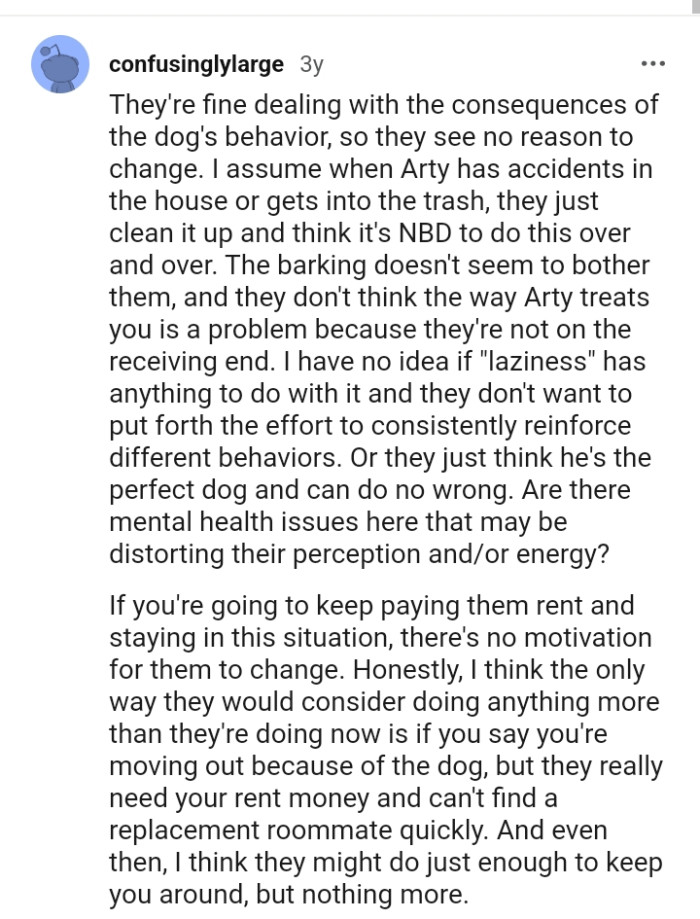Man Asks For Advice Because Housemates Won't Train Their Unruly Emotional Support Dog
An emotional support animal can significantly enhance the quality of life for those who have been diagnosed with depression, anxiety, post-traumatic stress disorder (PTSD), and other mental or psychological ailments. An ESA can ease one or more elements of a person's impairment through their companionship, solace, and unwavering love.
And yes! Any dog is eligible to serve as an ESA, no questions asked! Breed, size, and age limits are all unconstrained.
The OP happened to get an apartment with a married couple, and things have been pretty good for the most part. The thing is, their "emotional support" dog, a half-Chihuahua named Artimus, behaves badly.
Worst of all, the dog's parents aren't doing much to discipline him. The dog barks at any and every noise in the house and follows the OP around, growling, barking, and biting at him at every chance he gets, among other things.
When the OP reports the dog's behavior to its parents, their discipline only reinforces the dog's bad behavior. Now the OP has tried suggesting training tips to help curb the behavior, but they don't listen.
They still repeat what they did initially, which doesn't work. Mind you, the OP doesn't want them to get rid of their dog.
He is the type of person who loves dogs and wants to get one of his own soon, but he doesn't know what to do at this point.
The headline

The dog is constantly tearing through trash and going to the bathroom on the floor

The OP even tried suggesting training tips to help curb the behavior, but they don't listen

The Role of Emotional Support Animals
Dr. Timothy Baker, a psychologist with expertise in animal-assisted therapy, explains that emotional support animals (ESAs) can provide significant psychological benefits for their owners.
His research shows that ESAs can help reduce symptoms of anxiety and depression by offering companionship and emotional stability.
However, the success of an ESA often depends on the owner's ability to effectively train and manage the animal's behavior.
As usual, comments came in and here are a bunch of them for you to read through below

They are not acting responsibly enough

The barking doesn't even seem to bother them

Studies in the Journal of Clinical Psychology indicate that untrained or unruly ESAs can create more stress than they alleviate.
This highlights the importance of proper training and socialization to ensure that both the owner and the animal can thrive together.
When a pet is not well-adjusted, it can lead to increased frustration and conflict within shared living situations.
The owners don't realize that their negative reinforcement is making it worse

The OP could try stopping them when they give a weak punishment

This redditor says the OP should train the dog
This is not a question of discipline for the dog but for the humans ...always the case in a confused animal. Ask them if you can take over the training of the dog for two weeks. They must sit back, observe, and copy you. If you do what you said in your post, plus daily exercise, it will only take two days.
This redditor has got a similar story to share

Managing Difficult Behavior in Emotional Support Animals
To address issues with an emotional support animal's behavior, implementing consistent training and boundaries is key.
Research supports using positive reinforcement techniques to encourage desirable behaviors while discouraging unwanted ones.
Engaging a professional trainer can also provide valuable insights and strategies tailored to the specific needs of the animal.
They need their own little space with the dog

They can't stop making the dog think the OP isn't an intruder

Some people want a dog but not the responsibilities attached

Additionally, fostering an environment that prioritizes the mental health of both the owner and the animal is essential.
Incorporating regular exercise, socialization, and mental stimulation can help improve the animal's behavior while enhancing the bond between the owner and their pet.
Creating a structured routine can also provide stability for both parties, reducing stress and conflict.
The OP truly needs to consider whether adopting his own dog in that place is the best course of action. Otherwise, he'll just have to accept the obvious likelihood that change won't happen and decide whether he wants to continue living this way.
Yes, the house is dog-friendly, but the OP knows Arty won't ever be held responsible for any conflicts between the two dogs or have his conduct changed.
Ultimately, addressing behavioral issues in emotional support animals requires a comprehensive approach that involves training, socialization, and emotional support.
Encouraging open communication with housemates about the needs and behaviors of the ESA can foster a shared understanding and reduce tensions.
By prioritizing the well-being of both the owner and the animal, a more harmonious living situation can be achieved.
Psychological Analysis
This situation illustrates the challenges that arise when emotional support animals are not properly trained or managed.
It's essential for owners to take an active role in addressing behavioral issues to ensure a harmonious living environment.
Analysis generated by AI
Analysis & Alternative Approaches
In conclusion, managing an unruly emotional support animal involves understanding the complexities of training and emotional needs.
Research emphasizes the importance of consistent training and a supportive environment for both the owner and the animal.
Ultimately, fostering a balanced relationship can lead to a more positive experience for everyone involved.



